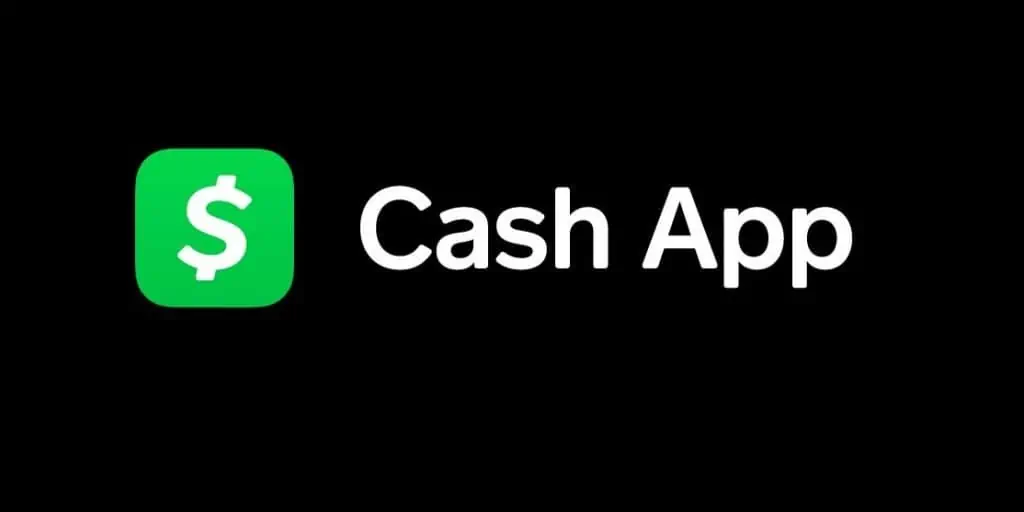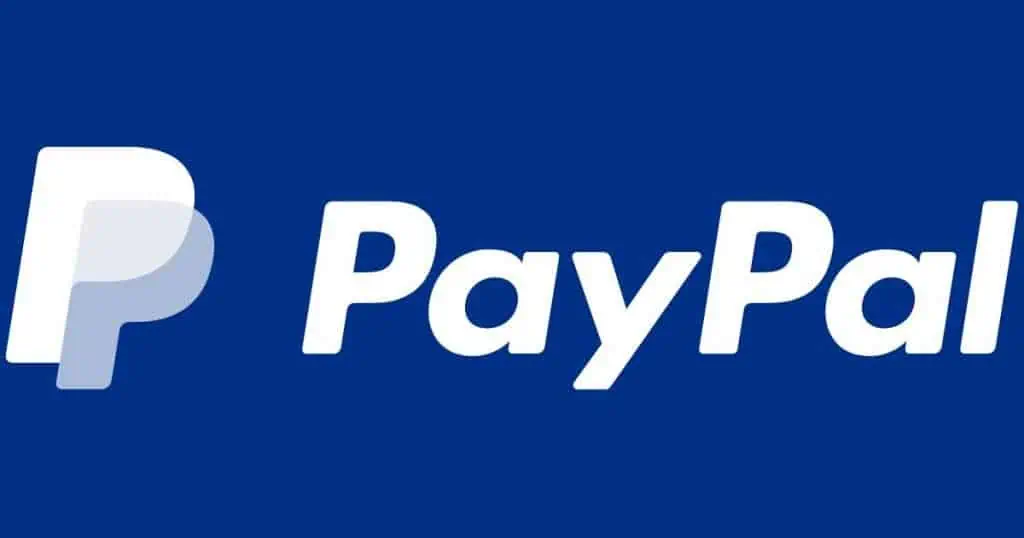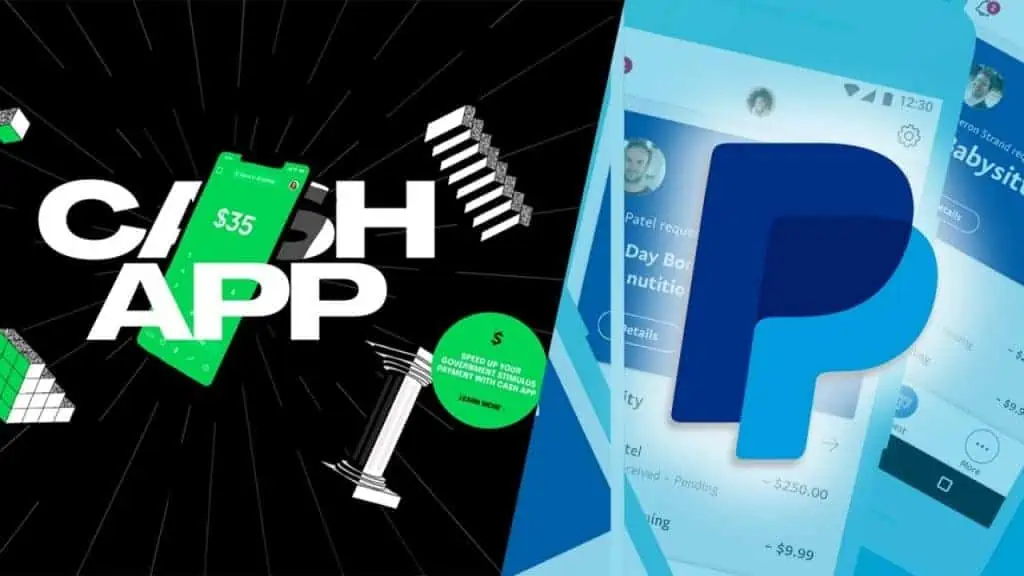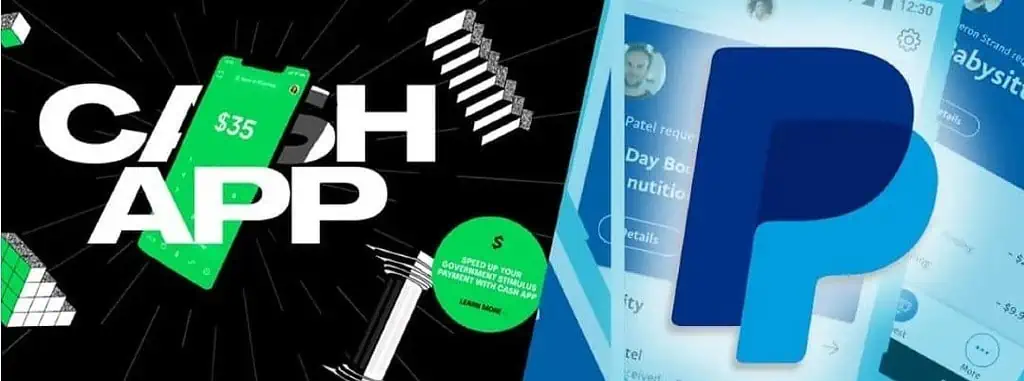Cash App and Paypal are two very similar pieces of software that allow you to do more with your money. There are similarities between the two, but I would argue that it’s the differences that will determine which one is ideal for your needs. In this article, I will go over the differences and similarities, comparing the two so you can find out which is the best one for you between Paypal vs Cash App.
While Cash App is better for personal use, Paypal is more advantageous for businesses because it can handle taking payments at a higher volume through websites. Cash App is restricted to card purchases and sending money to other Cash App users while Paypal is not. Paypal offers non-fee transfers to friends and family and Cash App don’t
| Cash App | Paypal | |
| Fees | 3% deposit charge on credit cards, 1.5% charge on debit cards. ATM fees waived dependent on monthly deposits | Business users pay 2.9% and $0.30 per payment. International transfers are 4.4% plus a fixed rate for the currency exchange |
| Customer support | Email only (with long response times) | Available online or on the phone 24/7 |
| Ease of use | Very easy to use with a superb design | Much more complex, but then the services are wider and more extensive |
| Referral | Referral bonus of $5 per user | $10 per friend referral, but varies from month to month |

We also made a super easy step by step guide on how to send money between Cash app and Paypal.
Cash App Pros
- Clean design for mobile users
- No fees for sending money to other Cash App users
- Can send money from a bank card to Cash App users
- Transfer money to bank accounts at no charge
- A referral program that awards $5 per user that joins
- Cash App card which allows you to use Cash App funds in stores
- Cashback deals on purchases
- Investment opportunities built into the app
- International payments
As you can see, there are a lot of pros to using Cash App. It’s a great service for sending money to other users because there’s no fee. You can even send that money to a bank account and still never pay a fee.
You’re able to deposit money through several methods, check out our guide for all of them, and of course, use the app to spend that money through a Cash App card.
Cash App offers users a couple of benefits that you can’t find anywhere else as well. For example, there’s a referral program that sees you earn $5 for every user who joins the service using your referral code. There are also a constantly changing group of outlets that you can earn cashback from when you spend with Cash App. For example, a recent promotion included $1 off any coffee or 10% off at Chipotle.
It’s also possible to make limited international payments with the app. These are only possible between the UK and US, but you can make these payments without any issue. Outside of these countries though, no international compatibility is possible.
Finally, the biggest pro that most users see with Cash App is their investment system. It’s possible to invest your funds in stocks or buy Bitcoin, allowing you to trade and earn money without it coming out of your main bank account.
Cash App Cons
- 3% credit card fee
- Deposits cost 1.5% in fees
The cons here may not necessarily outweigh the benefits, depending on how you’re using Cash App. The app’s biggest downside is the fact that you need to put money onto your Cash App card if you want to spend it in stores. This is where many users feel deceived because of the app’s name. Insinuating that you can spend money with the app.
Then there are the fees. If you send money from a card to your Cash App account or card, you pay a fee. That fee varies depending on whether it’s from a credit card or bank account.
Most users initially download Cash App and make the most of the referrals they can get. Then they use it as a platform to purchase Bitcoin or invest, but the fees make it very unattractive to those who want to use it as a regular bank account.

Paypal Pros
- Zero fees for family and friends transfers in or out
- High security
- International payments
- Paypal Card
- No fees for transferring money to your debit card
Paypal has been established since 1998. It’s one of the most common forms of payment for websites such as eBay because of the easy-to-use software and high security. Above all, Paypal makes you feel good about your purchases because you can recall any money you’ve sent if a product that you’ve ordered doesn’t arrive, for example.
Apart from the security that users feel, there are also very few fees to pay. Paypal allows you to receive international payments and have them converted to your local currency. You can spend in the same way as well, and the fees you pay are minimal, comparative to conversion rates of the day.
Paypal offers a card that you can spend money directly from your account on. This card too has several cashback opportunities, but there’s no restriction on where you spend. Cashback is automatic on all card purchases.
When you transfer money to friends and family or your own bank account via a debit card, there are no fees. If it’s not a friend or family member, the fee is 1%, which is still lower than Cash App’s fee of 1.5%.
Paypal Cons
- Business fees are extortionate
The major drawbacks of Paypal are only applicable if you’re using it as a business. Users that operate a business are charged a 2.9% fee and $0.30 when being sent money for services or goods. Furthermore, international transfers are charged at 4.4%, plus a fixed rate for the currency being transferred.

Paypal vs Cash App
Let’s look at the benefits and drawbacks of both side by side. While Cash App seems very convenient on the surface, it’s a lot more awkward than Paypal in reality. Cash App requires you to get a card and only make payments with that card unless transferring to other Cash App users. If you have to send money to a bank account, Cash App charges you a fee regardless of who they are, while Paypal removes the fee for family and friends.
Cash App is a very good-looking application. It’s been designed for ease-of-use on your phone, and that shows how many people have it. While that might be true, Paypal has the more friendly features of withdrawing money directly to your bank account via a debit card.
The difference seems to be dependent on how you use each service. Paypal is great for personal use, but not for business use. Cash App may not be fantastic for either, but it does give you an easy way to invest in cryptocurrency, stocks, and shares.
Verdict
Ultimately, whether you use Cash App or Paypal depends on your needs. If you want an online bank that’s great for sending money between friends and family regardless of platform, Paypal looks like the best bet. If you just want to transfer money between Cash App users though, then Cash app will work just as well.
For cryptocurrency and investment, Cash App is the clear winner. While you can use Paypal through brokers, everything is self-contained in Cash App, making it easier to manage on the go. The fact that you can pull in money from your bank accounts with it adds to these benefits.
For businesses, however, neither seems brilliant. Paypal is the clear winner for businesses, but the fees may be worse than offers you’d get with other banks. If you’ve got a high product turnover and only take payments in your local currency, this issue could even be overlooked.
Take all of this into consideration when alayzing the Paypal vs Cash App argument. It’s worth knowing everything when it comes to your money so you can make the most of it.
